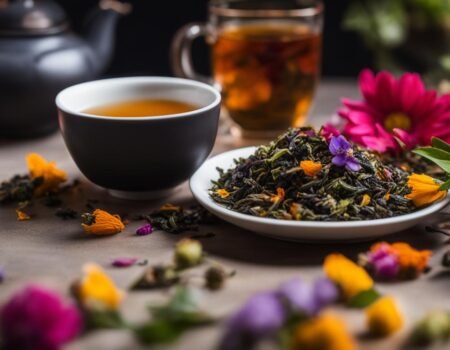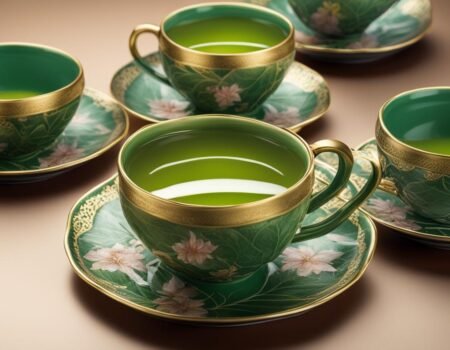
Dairy-Free Delights: Exploring Milk Alternatives in Chai Tea
Welcome to our delightful journey into the world of dairy-free chai tea! If you’re a fan of this aromatic and invigorating beverage but are looking for alternatives to dairy milk, you’ve come to the right place. We’ll explore the different milk substitutes that can be used in chai tea, allowing you to enjoy your favorite drink without compromising your dietary preferences. From almond milk to oat milk, we’ll uncover the perfect dairy-free options for your chai adventures.
Key Takeaways:
- Discover a world of dairy-free alternatives to milk in chai tea.
- Almond milk, soy milk, coconut milk, oat milk, and rice milk are popular options.
- Each dairy substitute brings its own unique flavor and texture to chai tea.
- Experiment with different combinations to find your perfect dairy-free chai recipe.
- Enjoy the comforting and indulgent experience of chai tea without the dairy.
The Origins of Chai Tea and its Cultural Significance
Chai tea has a fascinating history that traces back centuries in India. It was originally crafted using a blend of spices, each with its own unique flavor and aroma. The combination of these spices, along with black tea and milk, creates a beverage that is rich, flavorful, and deeply ingrained in Indian culture.
Chai tea holds a significant place in Indian society, symbolizing warmth, hospitality, and connection. It has been a staple in Indian households for generations and is often served to guests as a gesture of welcome and friendship. In fact, the tradition of sharing chai tea has become a cherished ritual in many parts of India, where friends and family gather to enjoy each other’s company over a steaming cup of this aromatic brew.
Beyond its cultural significance, chai tea has also played a role in Indian Ayurvedic medicine. The combination of spices and black tea is believed to have balancing and rejuvenating properties, making chai tea not only a delicious beverage but also a tonic for the body and mind.
“Chai is a way of life in India. It brings people together and creates a sense of community. It’s more than just a drink, it’s a cultural experience.” – Indian Tea Connoisseur
The popularity of chai tea has spread far beyond India, with variations of this beloved beverage being enjoyed worldwide. Each region adds its own twist to the recipe, resulting in a diverse range of chai tea flavors and preparations. From the bustling streets of Mumbai to the cozy cafes of New York City, chai tea continues to captivate and delight people of all backgrounds.
Indian Chai Tea Recipe
If you want to experience the true essence of chai tea, here’s a traditional Indian recipe that you can try at home:
- In a saucepan, add 1 cup of water and bring it to a boil.
- Add 1 teaspoon of black tea leaves and 1 teaspoon of your favorite chai tea spices (such as cardamom, cinnamon, cloves, ginger, and black pepper).
- Reduce the heat to low and let the tea simmer for 5 minutes to allow the flavors to infuse.
- Add 1 cup of milk and 1 tablespoon of sweetener (such as sugar or honey).
- Stir well and simmer for another 2-3 minutes until the tea is hot and well-blended.
- Strain the tea into cups and serve hot.
Enjoy the rich and authentic taste of Indian chai tea, and immerse yourself in the vibrant culture that surrounds this beloved beverage.
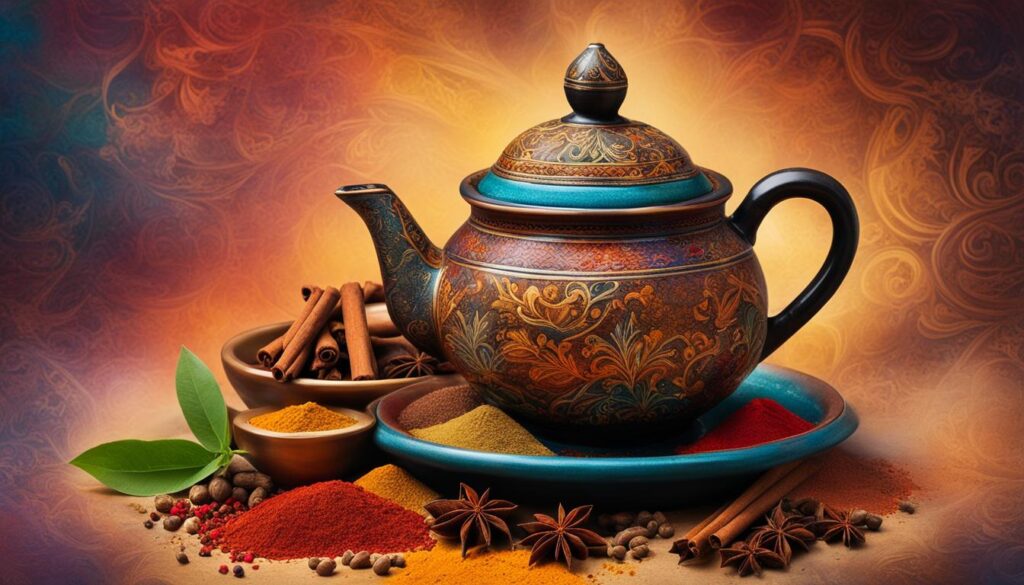
The Dairy Component in Traditional Chai Tea
When it comes to traditional chai tea, milk is an essential ingredient that adds a creamy and velvety texture to the beverage. The dairy component in chai tea plays a crucial role in enhancing the taste and balancing out the strong flavors of the spices. The fat content in milk adds depth and richness to the overall experience.
Traditionally, chai tea is prepared by brewing a blend of spices and tea leaves in water. Once the flavors have infused, milk is added along with sweetener to create a well-rounded and comforting drink. The milk not only complements the spices but also brings a smooth and soothing element to each sip.
However, for those who follow a dairy-free diet or are lactose-intolerant, there are several alternatives to dairy milk that can be used in chai tea. These dairy substitutes provide a creamy consistency and can be seamlessly incorporated into chai tea recipes, allowing everyone to enjoy the flavors of this beloved beverage without compromising dietary restrictions.
| Dairy Substitutes | Flavor Profile | Texture | Key Benefits |
|---|---|---|---|
| Almond Milk | Subtle nuttiness | Creamy | Low in calories, cholesterol-free, rich in vitamin E and calcium |
| Soy Milk | Creamy and slightly sweet | Smooth | Good source of protein, low in saturated fat |
| Coconut Milk | Tropical twist | Luscious | Rich in healthy fats, adds a hint of sweetness |
| Oat Milk | Creamier texture | Silky | Good source of fiber and essential nutrients |
| Rice Milk | Mild and slightly sweet | Light | Easy to digest, suitable for those with multiple dietary restrictions |
Experimenting with different dairy substitutes in chai tea allows you to discover new flavor combinations and find the perfect match for your taste preferences. Whether you choose almond milk for its subtle nuttiness, soy milk for its creamy sweetness, or any other substitute, you can still enjoy the comforting and indulgent experience that chai tea brings, even without the traditional dairy component.
Common Dairy Substitutes in Chai Tea
For those who follow a dairy-free diet or have lactose intolerance, there are several alternatives to dairy milk that can be used in chai tea. These dairy substitutes provide a creamy consistency and can be easily incorporated into chai tea recipes.
Almond Milk
Almond milk is a popular choice among dairy substitutes for chai tea. It adds a subtle nuttiness and creamy texture to the beverage. Almond milk is rich in vitamin E and calcium, making it a nutritious option for those looking for a dairy-free alternative.
Soy Milk
Soy milk is another common dairy substitute that can be used in chai tea. It has a creamy and slightly sweet flavor that complements the spices in chai tea. Soy milk is an excellent source of protein and is often fortified with essential vitamins and minerals.
Coconut Milk
Coconut milk adds a tropical twist to chai tea when used as a dairy substitute. It lends a rich and creamy texture to the beverage, enhancing its flavors. Coconut milk is known for its unique taste and is often used in various cuisines around the world.
Oat Milk
Oat milk is another dairy-free option that can be used in chai tea. It provides a creamier texture and has a mild flavor that complements the spices in chai tea. Oat milk is derived from oats, making it suitable for those who are allergic to nuts or soy.
Rice Milk
Rice milk is a dairy substitute that adds a slightly sweet taste to chai tea. It is made from milled rice and has a thin consistency. Rice milk is often used in desserts and can be a suitable option for those with multiple food allergies or intolerances.
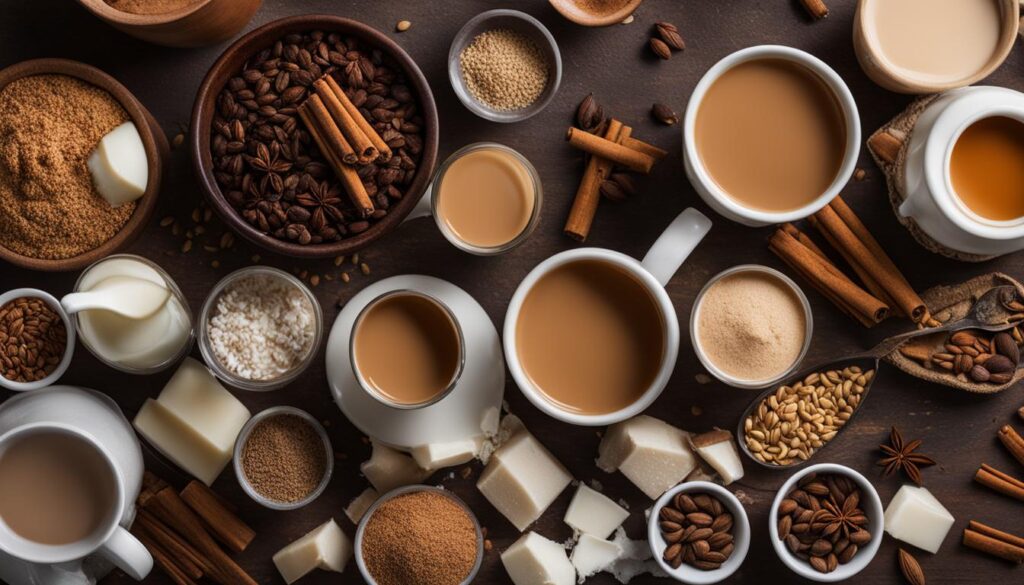
Experiment with these dairy substitutes to find the one that best suits your taste preferences and dietary needs. Whether you choose almond milk, soy milk, coconut milk, oat milk, or rice milk, each alternative brings its own unique flavor and texture to chai tea. Enjoy the indulgence of a warm cup of chai tea without the presence of dairy.
Dairy-Free Chai Tea Options and Milk Compatibility with Different Chai Tea Types
When it comes to enjoying chai tea without the dairy, there are plenty of options to explore. Whether you have dietary restrictions or simply prefer a dairy-free lifestyle, incorporating milk alternatives into your chai tea can enhance both the flavor and texture of this beloved beverage. However, it’s important to consider the compatibility between the specific type of chai tea and the dairy substitute being used.
“The right combination of chai tea and milk substitute can create a harmonious and indulgent experience,” says tea expert, Sarah Green. “Each type of chai tea has its own distinct flavor profile, and choosing the right dairy substitute can enhance those flavors or potentially overpower them.”
For a comprehensive understanding of the compatibility between chai tea types and dairy substitutes, let’s take a closer look at the table below:
| Chai Tea Type | Dairy Substitute | Flavor Profile | Compatibility |
|---|---|---|---|
| Traditional Masala Chai | Almond Milk | Warm, spicy, and aromatic | Excellent – Almond milk’s subtle nuttiness complements the spices perfectly |
| Cardamom Chai | Oat Milk | Delicate and floral | Good – Oat milk provides a creamier texture while allowing cardamom’s flavor to shine |
| Ginger Chai | Coconut Milk | Refreshing and invigorating | Great – The tropical twist of coconut milk pairs well with the boldness of ginger |
| Mint Chai | Soy Milk | Cooling and soothing | Fair – Soy milk’s creaminess can sometimes overpower the delicate mint flavor |
Keep in mind that these compatibility notes are not definitive rules, but rather suggestions based on flavor profiles. Personal taste and preference play a significant role in finding the perfect combination.
“Experimenting with different dairy substitutes can lead to delightful surprises,” says Sarah Green. “Don’t be afraid to try something new and unexpected. You might discover a unique chai tea experience that truly stands out.”
By considering the flavor profiles of different chai tea types and the unique characteristics of dairy substitutes, you can curate a chai tea experience that suits your taste preferences and dietary needs. So go ahead, explore the world of dairy-free chai tea options and elevate your chai tea enjoyment to a new level!
Summary:
- Dairy-free chai tea options provide alternatives for those with dietary restrictions or a preference for a dairy-free lifestyle.
- The compatibility between chai tea types and dairy substitutes is crucial for a harmonious flavor experience.
- Experimenting with different combinations can lead to delightful surprises and unique chai tea experiences.
The Perfect Combination: Chai Tea with Almond Milk
Indulge in the delightful combination of chai tea with almond milk, a match made in beverage heaven. Almond milk brings a creamy texture and a subtly nutty flavor that perfectly complements the aromatic spices in chai tea. Whether you’re lactose-intolerant or following a dairy-free diet, this dairy substitute adds a rich and satisfying element to your chai tea experience.
Almond milk offers more than just great taste. It is low in calories, making it a healthier alternative to dairy milk. Additionally, almond milk is cholesterol-free and packed with essential nutrients such as vitamin E and calcium. So, while enjoying the comforting flavors of chai tea, you can also nourish your body with these beneficial nutrients.
“Chai tea with almond milk is like a warm hug for your taste buds. The creaminess of the almond milk blends harmoniously with the bold flavors of the spices, creating a drink that is both comforting and invigorating.” – Chai Lover
When preparing your chai tea with almond milk, it’s important to find the right balance between the intensity of the spices and the creaminess of the almond milk. Start by brewing your chai tea blend with water and spices to create a strong base. Then, add the almond milk gradually until you achieve the desired consistency and taste. Feel free to experiment with different ratios to find your perfect cup of chai tea.
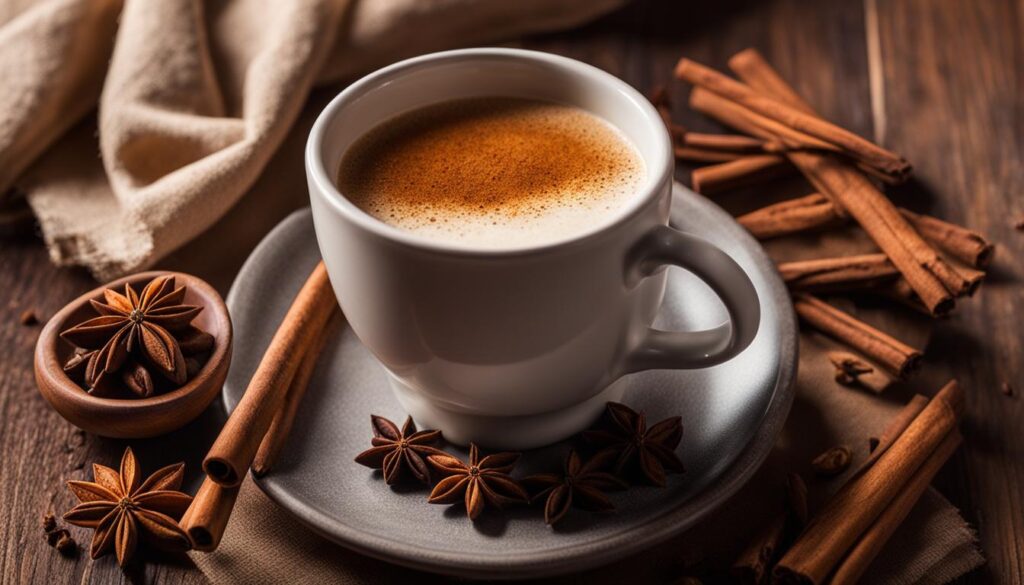
Chai Tea with Almond Milk Recipe
| Ingredients: | Instructions: |
|---|---|
|
|
Conclusion
So there you have it, dairy-free chai lovers! We’ve explored the wonderful world of dairy alternatives in chai tea, allowing you to savor this beloved beverage without the milk. Whether you prefer the subtle nuttiness of almond milk, the creamy sweetness of coconut milk, or the velvety texture of oat milk, there are plenty of options to suit your taste preferences and dietary needs.
By experimenting with different dairy substitutes, you can create your own collection of dairy-free chai recipes and enjoy the comforting and indulgent experience that chai tea brings, without any dairy products. So go ahead, spice up your life and grab a cup of chai tea without milk!
Dairy-Free Chai Recipes
Looking for some inspiration? Try our favorite dairy-free chai recipe:
Ingredients:
- 2 cups water
- 4 tea bags or 4 tablespoons loose tea
- 1 cinnamon stick
- 4 cardamom pods, crushed
- 1-inch piece of fresh ginger, peeled and sliced
- 1 cup dairy-free milk of your choice (almond, coconut, soy, etc.)
- Sweetener (optional)
Instructions:
- In a saucepan, bring the water to a boil.
- Add the tea bags or loose tea, cinnamon stick, crushed cardamom pods, and sliced ginger.
- Reduce the heat and simmer for 10 minutes.
- Remove from heat and strain the mixture into cups.
- Stir in the dairy-free milk and sweetener, if desired.
- Enjoy your homemade dairy-free chai tea!
Remember, feel free to experiment with different spices and adjust the sweetness to your liking. The possibilities are endless!
FAQ
Can I use dairy-free milk in chai tea?
Yes, you can use dairy-free milk as an alternative to traditional milk in chai tea. Popular options include almond milk, soy milk, coconut milk, oat milk, and rice milk.
What are the benefits of using almond milk in chai tea?
Almond milk adds a creamy texture and a slightly nutty flavor to chai tea. It is a great choice for those who are lactose-intolerant or following a dairy-free diet. Almond milk is low in calories, cholesterol-free, and provides essential nutrients such as vitamin E and calcium.
Can I use instant chai tea mixes with dairy-free milk?
It’s important to read the ingredients label of instant chai tea mixes to ensure they are dairy-free. Some mixes may contain milk powder or other dairy derivatives. Making your own dairy-free chai tea at home allows you to have control over the ingredients and choose the right dairy substitute.
How do different types of dairy-free milk impact the flavor of chai tea?
Each dairy substitute brings its own unique flavor and texture to chai tea. Almond milk adds a subtle nuttiness, soy milk brings a creamy and slightly sweet flavor, coconut milk adds a tropical twist, oat milk provides a creamier texture, and rice milk adds a mild and slightly sweet taste.
Can I experiment with different dairy-free milk options in chai tea?
Absolutely! Feel free to explore different combinations of dairy-free milk in chai tea and find the one that suits your taste preferences and dietary needs.
Are there any other dairy substitutes I can use in chai tea?
Apart from almond milk, soy milk, coconut milk, oat milk, and rice milk, there are other dairy substitutes available in the market. You can also try cashew milk, hemp milk, or pea milk as alternatives in chai tea.





